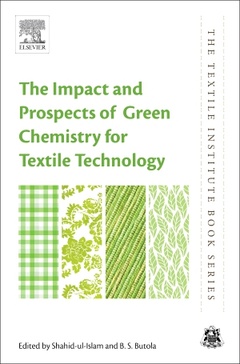Description
The Impact and Prospects of Green Chemistry for Textile Technology
The Textile Institute Book Series
Coordinators: Ul Islam Shahid, Butola Bhupendra Singh
Language: English
Subjects for The Impact and Prospects of Green Chemistry for Textile...:
Keywords
water; carbon; footprint; environment; sustainable; economics; textile; processing; waste; dyeing; adsorbents; treatment; plasma; fibers; coatings; nanotechnology; biopolymers
568 p. · 15x22.8 cm · Paperback
Description
/li>Contents
/li>Readership
/li>Biography
/li>Comment
/li>
The Impact and Prospects of Green Chemistry for Textile Technology provides a review and summary of the role of green chemistry in textiles, including the use of green agents and sustainable technologies in different textile applications. The book systematically covers the history and chemistry of eco-friendly colorants, chitin, chitosan, cyclodextrin, biomordants, antimicrobial, UV protective, flame retardant, insect repellant textiles, and advanced pre- and post- treatment technologies, such as the sonochemistry and plasma methods currently employed in functional modifications. The book also pays attention to the remediation of textile effluents using novel, sustainable and inexpensive adsorbents.
Written by high profile contributors with many years of experience in textile technology, the book gives engineers and materials scientists in the textile industry the information they need to effectively deploy these green technologies and processes.
2. Sustainable colorants
3. Metal mordants and Biomordants
4. Sustainable Cyclodextrin in Textile Applications
5. Chitin and Chitosan
6. Sustainable textile chemical processing using Enzymes
7. The Sonochemical Functionalization of Textiles
8. Non-thermal plasma: a promising green technology to improve environmental performance of textile Industries
9. Textile finishing with biomacromolecules: a low environmental impact approach in flame retardancy
10. Antimicrobial Textiles
11. Insect repellent textiles using green and sustainable approaches
12. UV Protective Textiles
13. Treatment Technologies in Textile Industry Effluent
14. Application of chitosan derivatives as promising adsorbents for treatment of textile wastewater
15. Recent Advances in Remediation of Synthetic Dyes from Wastewaters using Sustainable and Low Cost Adsorbent
16. Treatment of industrial dyes using chitosan-supported nanocomposite adsorbents
Academic and industrial researchers (materials scientists) working in the fields of dye and pigments, textile engineering, polymers, and sustainable chemistry as it relates to textiles
B. S. Butola is a Professor at the Department of Textiles & Fibre Engineering, IIT Delhi, India. His research interests include functionalization of textiles with metal oxides, use of shear thickening fluids for improving the impact performance of ballistic textiles, polymeric nanocomposites and smart colorants. He has edited 7 books.
- Introduces green chemistry and sustainable technologies, and explores their role in different textile applications
- Examines the use of renewable materials, such as biopolymers, dyes and pigments, biomordants, polyphenols and plant extracts in functional finishing applications
- Deals the functional modification of textiles using state-of-the-art biotechnology and nanotechnology




